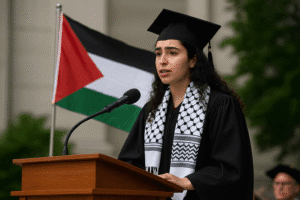Palestine Solidarity Sparks Shock: 5 Powerful Lessons from MIT Graduate’s Bold Commencement Speech
At MIT’s 2025 commencement, class president Megha Vemuri delivered a powerful and unexpected address that spotlighted the university’s ties to Israel amid the ongoing conflict in Gaza. Wearing a keffiyeh in solidarity with Palestine, she condemned MIT’s research partnerships with the Israeli military, calling them a form of complicity in what she described as genocide. Vemuri praised student activists for their courage in the face of institutional suppression and urged graduates to continue demanding change as alumni.
Her speech reframed the role of academia, emphasizing moral responsibility over institutional allegiance. By using the commencement stage to confront global injustice, she highlighted the urgency of accountability and the personal cost of speaking out. Her words gave voice to a generation unwilling to remain silent, challenging both peers and universities to act with conscience. Vemuri’s message marks a pivotal moment in student-led advocacy, resonating far beyond MIT’s campus.

Palestine Solidarity Sparks Shock: 5 Powerful Lessons from MIT Graduate’s Bold Commencement Speech
The traditional pomp of MIT’s 2025 commencement ceremony carried an unexpected weight this year. As Megha Vemuri, the Indian-American president of the graduating class, stepped to the podium, her academic regalia was punctuated by a distinct symbol: the black-and-white keffiyeh scarf, a powerful emblem of Palestinian solidarity. What followed was not merely a farewell to classmates, but a direct, impassioned critique of the university’s institutional ties to Israel, transforming a celebratory moment into a platform for profound ethical questioning.
A Speech Anchored in Moral Conviction
Vemuri’s address cut through the ceremonial atmosphere with stark clarity. She directly linked MIT to the conflict in Gaza, stating, “The Israeli occupation forces are the only foreign military that MIT has research ties with.” This connection, she argued, made the university complicit: “This means that Israel’s assault on the Palestinian people is not only aided and abetted by our country, but our school.”
Her condemnation was unequivocal. “We are watching Israel try to wipe Palestine off the face of the earth, and it is a shame that MIT is a part of it,” she declared, highlighting the devastating impact on Gaza’s academic infrastructure: “As we prepare to graduate… there are no universities left in Gaza.”
Praise for Student Activism and a Call to Alumni Action
Vemuri didn’t just criticize; she celebrated the resilience of her peers. She recounted how MIT students had “faced threats, intimidation, and suppression coming from all directions, especially your own university officials,” yet had “prevailed” in advocating for Palestinian rights. She pointed to overwhelming student votes demanding MIT sever ties with the Israeli military, framing this activism as a reflection of the MIT community’s core values: “Because the MIT community that I know would never tolerate a genocide.”
Her message extended beyond the campus gates. She charged her fellow graduates – future scientists, engineers, academics, and leaders – with an ongoing moral responsibility: “We have a commitment to support life, support aid efforts, and call for an arms embargo and keep demanding now, as alumni, that MIT cut ties.”
The Weight of the Moment
Vemuri acknowledged the fraught atmosphere on campuses nationwide, shrouded in a “dark cloud of uncertainty” and fear surrounding student activism on Palestine. Her decision to use the commencement stage – a moment of institutional honor and celebration – for such a politically charged critique was a deliberate act of courage. It underscored the depth of conviction driving the student movement and the perceived urgency of the situation in Gaza.
Why This Resonates: Beyond the Headlines
Vemuri’s speech transcends a simple protest statement. It represents several critical, human realities:
- The Power of Platform: She leveraged a uniquely visible and prestigious platform to amplify a marginalized cause, demonstrating how institutional spaces can be challenged from within.
- Alumni as Agents of Change: Her direct call to graduates to leverage their new status as alumni reframes the relationship between graduates and their alma mater, emphasizing accountability over blind loyalty.
- The Personal Cost of Conscience: Wearing the keffiyeh and delivering this speech amidst potential backlash exemplifies the personal risks students increasingly take for their beliefs.
- Institutional Complicity Under Scrutiny: It forces uncomfortable questions about the ethical boundaries of university research partnerships and investments, particularly when linked to military actions causing widespread civilian suffering.
- The Human Face of Student Activism: It moves beyond abstract “protests” to show a top student leader, chosen by her peers, grounding her critique in specific institutional ties and a clear moral imperative against genocide.
Megha Vemuri’s commencement address wasn’t just a graduation speech; it was a defining moment of moral clarity delivered from the heart of one of the world’s most prestigious academic institutions. It signals a generation determined to hold power – including their own universities – accountable, carrying the weight of Gaza’s devastation and a demand for justice with them as they step into the wider world. Her words, and the keffiyeh she wore, will resonate far beyond the MIT campus, challenging graduates and institutions alike to examine their own complicity and choose a side: silence, or solidarity.
You must be logged in to post a comment.